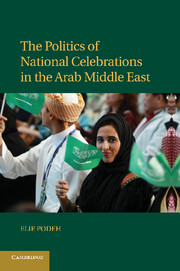7 - Saudi Arabia
Between Religious and Secular Holidays
Published online by Cambridge University Press: 05 July 2011
Summary
On 23 September 1932, ‘Abd al-‘Aziz ibn Sa‘ud proclaimed the establishment of Saudi Arabia, which consisted of the two main regions of Najd and Hijaz, as well as other areas conquered in the successful military campaign he started in 1902 with the capture of Riyadh. The name of the new kingdom “commemorated Ibn Sa‘ud's part in creating a unified state under his authority.” Ever since, the legitimacy of the Saudis has been based on two pillars: their role – and particularly that of the founding king – in the creation of the Saudi Kingdom; and their alliance with the religious Wahhabi establishment, forged as early as 1744 between the ruler, Muhammad bin Sa‘ud, and Shaykh Muhammad bin ‘Abd al-Wahhab.
In contrast to Egypt and other Arab countries in the Fertile Crescent and North Africa, whose formation was affected largely by Western imperialism, Saudi Arabia did not experience colonial rule, and the Western model of the state was not as relevant to its formation. As a result, according to David Long, the Saudis “have never adopted a national inferiority complex and other psychological baggage acquired by many colonized peoples.”
Since its foundation, Saudi Arabia has been governed by the Shari‘a and the Sunna. The religious foundations of the kingdom were institutionalized in the Basic Law of Government, which was promulgated by King Fahd in 1992. Political culture, therefore, has always been based on Islamic norms and customs.
- Type
- Chapter
- Information
- The Politics of National Celebrations in the Arab Middle East , pp. 255 - 284Publisher: Cambridge University PressPrint publication year: 2011
- 1
- Cited by



